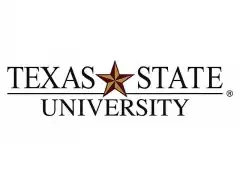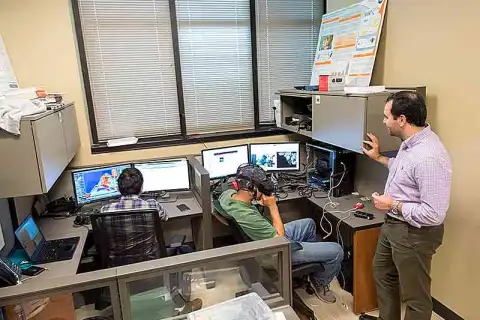Master of Science - Quantitative Finance and Economics (Non-thesis Option)
- 2 years
- Duration
- 16,380 USD/year
- Price
- Rolling admission
- Start
- Rolling admission
- Deadline
- Master
- Degree
- Campus
- Format
- San Marcos / USA
- Location
- Texas State University, USA
- School
Program description
The sciences of finance and economics are intimately related, with each offering unique perspectives on the same competitive issues that businesses encounter and the laws that governments enact. Offering a degree program that blends economics and finance is supported by the synergies created between the disciplines by this confluence of interests and shared outcome.
The Master of Science program in Quantitative Finance and Economics is intended for professionals or undergraduate STEM majors who want to improve their competitiveness in the modern workforce by learning more analytical techniques.
Program structure
The Master of Science (M.S.) degree with a major in Quantitative Finance and Economics requires 30 semester credit hours.
Required Courses
- Investment Analysis
- Microeconomic Theory and Applications
- Macroeconomic Theory and Applications
- Econometrics
- Financial Theory and Corporate Policy
- Financial Econometrics
Prescribed Electives
- Financial Analytics
Choose 9 hours from the following:
- Fixed Income Analysis
- Internship
- International Economics
- Financial Markets and Institutions
- Securities Law
- Independent Study
Price
- Tuition an Fees: 16,380 USD/year
- Books and Supplies: 780 USD
- Housing and Food (On campus):13,000 USD
- Personal and Misc: 2,750 USD
- Travel: 1,660 USD
- Total: 34,570 USD
Contact EduMapple manager to learn more about scholarship opportunities
- $90 nonrefundable application fee for applications with international credentials
Requirements for applicants
- сompleted online application
- $90 nonrefundable application fee for applications with international credentials
- baccalaureate degree from a regionally accredited university (Non-U.S. degrees must be equivalent to a four-year U.S. Bachelor’s degree. In most cases, three-year degrees are not considered.)
- official transcripts from each institution where course credit was granted
- a competitive GPA in the last 60 hours of undergraduate coursework (plus any completed graduate courses)
- Prerequisites: A minimum grade of B in Principles of Microeconomics and Macroeconomics (or equivalent), Quantitative Methods and Statistics (or equivalent), Business Calculus or equivalent), and Business Finance (or equivalent)
- official GMAT/GRE (general test only) not required for applicants with a last-60-hours GPA of 3.5 or higher. If the last-60-hours GPA falls below the minimum requirement of 3.5, the official GMAT or GRE (general test only) with competitive scores will be required to be considered. The Graduate College will notify applicants via email should this occur.
- responses to specific essay questions
- resume/CV detailing work experience, extracurricular and community activities, and honors and achievements
- three letters of recommendation from individuals best able to assess the student’s ability to succeed in graduate school
Given the required prerequisite courses and quantitative and analytical nature of the program, students with undergraduate degrees in Accounting, Economics, Finance, Information Systems, Engineering, Mathematics, Statistics, and Physics are suitable applicants, although students with other degrees may be considered. The program is targeted at full time students. However, part-time students can enroll in the program with a longer time frame for completion. Students must have completed the prerequisite courses by the end of the summer before the student’s first fall semester of the program.
Applicants should refer to The Graduate College website for additional information regarding the admission process.
English language requirements
- TOEFL iBT scores required with a 78 overall and minimum individual module scores of 19 listening, 19 reading, 19 speaking, 18 writing
- official PTE scores required with a 52 overall
- official IELTS (academic) scores required with a 6.5 overall and minimum individual module scores of 6.0
- official Duolingo scores with a 110 overall
About the university

Why Texas State University?
Our strong faith in the ability of education to change communities, drive economies, and reimagine the world serves as the foundation for Texas State University, a public, student-centered research university. From all walks of life, our students come from all around Texas, the country, and the world.
Austin is less than an hour away from our San Marcos campus. You're close to one of the US cities with the quickest rate of growth. Austin's booming IT industry has earned it the moniker "Silicon Hills." Here, businesses like Dell and Advanced Micro Devices have made their homes. Apple, Tesla, Google, and Oracle have all recently increased their business activities. Our campuses provide the ideal mix of professional ties and academic achievement.
We help you achieve your next professional objectives. More than 200 corporations have relocated to Texas, and the state is home to 55 Fortune 500 companies. There are therefore many of job alternatives available to you. We provide individualized resources and assistance to help you thrive outside of the classroom. You'll succeed at the top three US destinations for international students, whether you're in business or technology.





